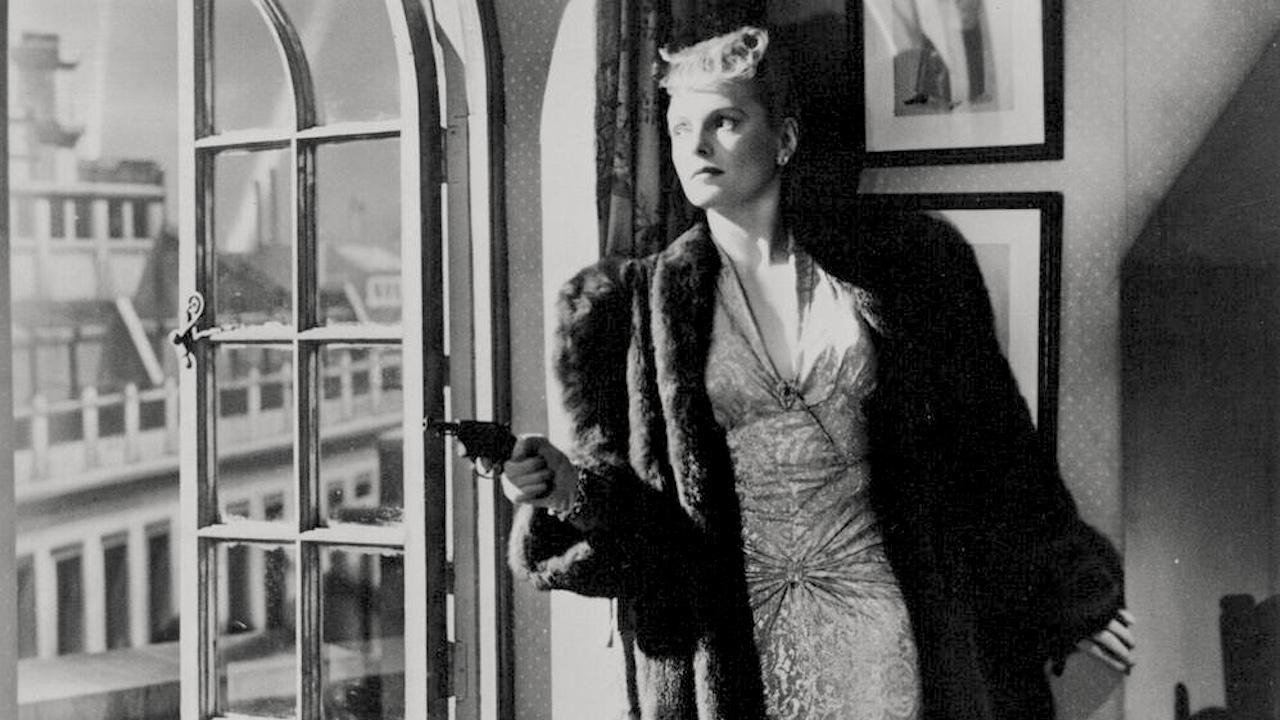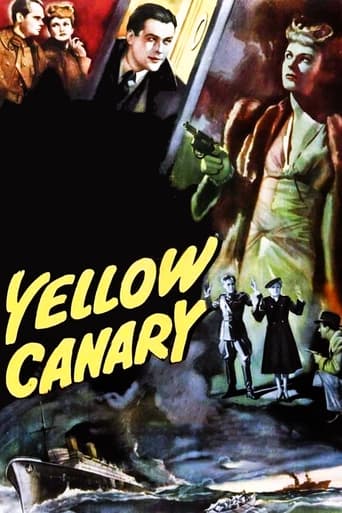

Don't listen to the negative reviews
... View Moredisgusting, overrated, pointless
... View MoreAn absolute waste of money
... View MoreWhile it doesn't offer any answers, it both thrills and makes you think.
... View MoreYellow Canary has a daring story considering it was made in 1943 but it is also a flag waving propaganda movie as well. Inspired by someone like Unity Mitford, Anna Neagle plays the socialite Sally Maitland who is in sympathy with the Nazis and an admirer of Hitler.Maitland is sent over to Canada and trailing her are spies from Britain and Germany. However it seems Maitland might be in fact a double agent on a mission in Canada to uncover a Nazi spy network.The film is brisk but also silly especially when Maitland is so careless at one point with a British agent.
... View More***SPOILERS*** So-so WWII spy movie with Nazi admirer Sally Maitland, Anna Neagle, who's really, no kiddin!, working for the British I15 Intelligence Agency trying to get to the bottom of what the Nazis plan to do in bottling up all the British, the US wasn't at war at the time, ships docked in Halifax Harbor. That's by the Nazis planning to duplicate the 1917 explosion in the very same place that almost won them, but not quite, the First World War.Traveling coach on a dinky British freighter to Canada from Liverpool England Sally who's disliked by almost everyone on board, in being pro-German, strikes up a relationship with Polish freedom fighter Capt. Jan Orlack, Albert Lieven, who despite hating the Germans guts, for what they did to his native Poland, sees nothing at all wrong with her being so tight with the Nazi regime and even bragging about meeting and getting wined and dined by non other then Adolph Hitler when she visited Germany back in 1937! As for fellow undercover British intelligence agent the clean cut Let. Commander Jim Garrick, Richard Greene, who compared to the sleazy looking Col. Orlack, she treats him like absolute garbage without knowing that he there to make sure nothing bad happens to her. It's in Halifax that Sally meets Col. Orlack's mom Madame Orlack,Lucie Mannheim, who despite claiming that she lost her entire fortune back in Poland when the Nazis took over the country lives like a queen with all the fixing as well as money the goes alone with royalty: Except for not having paid her electricity bill for the mansion that she resides in!***SPOILERS*** Sally soon finds out that Madam Orlack and her boy Jan are really working for the Nazis and using their cover, as Polish freedom fighters, to help in Hitler's plans to conquer the world starting with the pesky, in not going along with the program, British Empire first. It's here where both Sally and by then reviled to her secret agent Garrick jump into action in alerting the Halifax police as well as I15 British Intelligence Acency of what's about to go down! In the Nazis evil plan to cut the Candadian life line to the UK, by blasting and bottling up Halifax Harbor. Sally ends up getting shot by Madam Orlack's Nazi thugs only to survive when hero of the day Let. Commander Garrick, and about a dozen Halifax policemen, raided the place. As well as Sally having a solid gold and indestructible, due to high quality German ingenuity, cigarette case given to her by non other the Col. Orlack that stopped cold in its tracks the bullet fired at Sally from killing her!
... View MoreAnna Neagle stars with Richard Greene, Albert Lieven, Nova Pilbeam, and Margaret Rutherford in the British film "The Yellow Canary" from 1943,Anna Neagle is Sally Maitland, a woman from a good family, estranged from them, who is a known Nazi sympathizer. She is forced to move to Halifax, Nova Scotia. On the ship, she meets a Polish aristocrat, Jan Orloch (Albert Lieven) and is also chased around by a British naval intelligence officer, Jimmy Garrick (Richard Greene). Once on dry land, she agrees to meet Jan's mother (Lucie Mannheim) who was blinded when the Nazis bombed their home.Garrick, meanwhile, is supposed to watch her every move. Enjoyable spy movie, with Neagle, the hugely popular British star, in fine form as a glamorous and somewhat snobby woman in this film, which has many twists and turns.Handsome Richard Greene was signed by 20th Century Fox, but went back to England during the war and served in the Royal Armoured Corps of the Twenty-Seventh Lancers, rising to Captain. His career never got off the ground again, but he is best known by us old-timers in the states for being Robin Hood in the British TV series, which made him filthy rich and well known. After that, he became a country gentleman, raising thoroughbreds. Here he is pleasant and earnest.Nova Pilbeam, who worked with Hitchcock, plays Neagle's mother in a small role.The smallest role is Margaret Rutherford, who is a riot and a real scene-stealer.If you see this is going to be on TCM, try and catch it.
... View MoreSally Maitland, the daughter of an upper-class family, makes herself unpopular in wartime Britain because of her pro-Nazi views- so much so that the authorities arrange for her to be sent to Canada. (The character of Sally was probably based upon Diana and Unity Mitford, two of the aristocratic Mitford sisters, both of whom held extreme right-wing views. The closeness of the first syllables of the names "Maitland" and "Mitford" is presumably no coincidence). While on board ship, she meets, and is romanced by, a refugee Polish army captain, forced to flee his homeland after the German invasion, and Jim Garrick, an officer with British Naval Intelligence, who has been sent to keep watch on her.Anna Neagle was a highly popular actress in Britain during this period. She specialised in playing heroines, particularly British national heroines such as Queen Victoria, Edith Cavell and the aviator Amy Johnson. To have played a villain, especially a traitor to her country, would have been a remarkable departure for her, so it is no surprise when Sally proves to be not the villain but the heroine of the piece, an agent with British Intelligence, sent to infiltrate a German spy-ring which is plotting to destroy the vital Canadian port of Halifax. In another twist typical of this type of spy drama, the supposed Polish officer turns out not to be a Pole at all, but rather one of the German spies.Anna Neagle's part, which she pulls off very well, can be considered a "double acting" role; she is playing the part of a character who is herself playing a part, pretending to be something she is not. During the first part of the film, while she is pretending to be a Nazi sympathiser, she seems convincing enough, with her cold, aristocratic hauteur, yet when the revelation comes about her true identity and motives I was not surprised; there is clearly something in her bearing which prepares the audience psychologically for a twist of this sort. There is also an amusing cameo from Margaret Rutherford as a cantankerous old battleaxe on the ship. (Those like me who have less than fond memories of the British TV show "That's Life"- an odd mixture of consumer investigations and childish humour- from the seventies and eighties will be amused to learn that the comedian Cyril Fletcher was churning out his appalling poetry as early as the forties).The film was obviously made as wartime propaganda, with the aim not only of keeping up morale but also of warning the British public to be on their guard against Nazi spies. Despite this, it is one of those wartime films which has remained watchable long after the end of the war.6/10
... View More